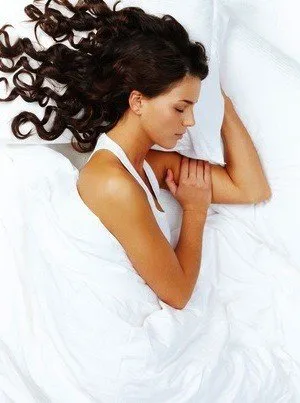There is a strong connection between the quality of sleep and skin quality. When we sleep, our bodies are restoring and repairing themselves, even our skin. During the time we are asleep at night, our bodies go through different stages that contribute to the health of our skin.
- Production of somatropin is a growth hormone produced at the start of sleep that repairs skin cell damage.
- Melatonin production helps us sleep and fights against free radicals, which are unstable atoms that damage cells in the body and skin.
- Collagen production is triggered at the final stage of sleep. Collagen supports the skin’s firmness.
Photo by Miriam Alonso: https://www.pexels.com/photo/calm-woman-sleeping-on-pillow-in-bedroom-7622521/
The benefits of sleep as you age
There are many benefits that sleep provides for our skin.
Fewer Wrinkles
When we sleep, our skin works hard to make collagen, which can help prevent sagging by providing structure and support to the skin.
Less Puffiness
Low-quality sleep gives our eyes a puffer look, and often we have dark circles or bags underneath. Staying well-hydrated and elevating your head can reduce the amount of puffiness, and better sleep can decrease the presence of dark circles.
Healthy Appearance
The skin on our face shows when we are tired: our eyelids and corners of our mouths droop, and our brows are creased more. There’s also the presence of red, swollen eyes and dark circles, which make you appear older. Better sleep equals a healthier, more youthful appearance.
Healthier Hair
Low-quality sleep can cause hair loss and damage. When we aren’t sleeping well, blood circulation decreases, which means hair follicles are losing out on the vitamins, nutrients, and minerals that they’re used to.
Additionally, less sleep can lead to stress, which elevates levels of cortisol in the body; elevated cortisol levels can lead to hair loss. When you’re getting enough sleep, your hair is likely to be healthy and full.
Products Are More Effective
When you sleep, your body and skin begin to repair themselves because they are not defending themselves from the sun.
And because blood flow is more consistent when you’re sleeping, your skin can benefit more from the ingredients in your skincare products, like masks.
Longevity beauty tip: There is also a sleep patch that can help you sleep better.
How to Improve Your Skin
Even one night of poor sleep can cause under-eye circles, wrinkles, and fine lines. To improve your skin, do the following:
fizkes/shutterstock
Longer Sleep
One of the best ways to start improving the appearance of your skin is by getting the recommended sleep every night. Poor sleep can age skin faster and leave you less satisfied with its quality. On average, aim for six to eight hours of sleep per night. To help, turn off electronics an hour before bed and spend the time unwinding.
Wash Face Before Bed
While sleeping can help repair your skin itself, it’s not going to do you much good if you’re going to sleep without washing your face first. Dirt and debris from the day can sink into the skin and contribute to acne and dry skin.
Moisturize
Moisturizing the skin is very important, especially at night. Moisturizing your skin before bed keeps your skin hydrated, and there are also moisturizing masks you can sleep in.
Change Your Pillowcase
Cotton pillowcases can be irritating to the skin and result in wrinkles in the long term; these wrinkles can occur from sleeping with our skin to the fabric. Instead, choose a satin or silk pillowcase, and aim to sleep on your back more.
Elevate Your Pillow
Certain factors can affect your quality of sleep, like acid reflux and snore. Elevating your pillow and head can alleviate these symptoms, and you can sleep better.
Having your head elevated can also improve blood flow and prevent blood from pooling, which can improve the appearance of dark circles.
Sleep in a Dark Room
The sun can have a damaging effect on our skin. When sleeping in a room with sunlight, the skin is directly exposed, and the sun can impact its appearance and health. Plus, the presence of sunlight and other light can disturb sleep rhythms. Because of the impact that bad sleep can have on the skin, it’s important to get a full night’s sleep to help our skin look firm and youthful.
Who is the author?
Vanessa Lamson
Vanessa Lamson is a freelance writer and editor living in California, where she lives with two fur babies. She has been writing for more than seven years and loves it.




